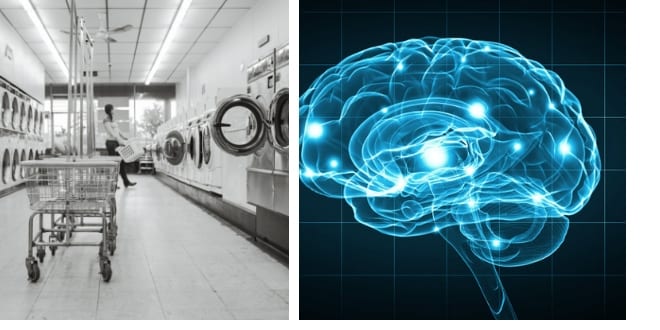Our brains are like modern washing machines – evolved to have the latest sophisticated programming, but more vulnerable to breakdown and prone to develop costly disorders, says neurobiology Prof. Rony Paz of the Weizmann Institute of Science in Rehovot, Israel. The price we pay for our advanced brains may be a greater tendency to disorders. The more evolutionarily advanced, the more efficient and the less robust each area has proved to be.
He and a group of other Israeli researchers recently conducted experiments in five monkeys and seven humans with incurable epilepsy and found that as the neural code gets more efficient, the ability to withstand or overcome damaging conditions, which prevents errors, is minimized. Their findings, which recently appeared in the journal Cell, may help to explain why disorders as anxiety, depression, attention-deficit hyperactivity disorder (ADHD), post-traumatic stress disorder (PTSD) and even autism are common in humans.
Paz noted that anatomical differences between humans and other primates have been described – particularly our large prefrontal cortex and its extended number of neurons. But differences in the neural code – the “software,” in contrast with the “hardware” (the physical structure) – have until now not been explored.
Raviv Pryluk, a research student in Paz’s group, created a way to test and compare the efficiency of the neural code in several regions of the brain. “We defined efficient communication as that which uses the least amount of energy to transmit the maximal information – to pass on as complicated message as possible with the fewest ‘words,’ ” said Pryluk.
The researchers recorded the electrical activity of single nerve cells in two brain regions in both humans and in macaque monkeys. They focused on the prefrontal cortex, where higher functions like decision making and rational thinking occur, and the amygdala, a more evolutionarily ancient region that is responsible for the “fight or flight” basic survival functions, as well as emotions.
Paz and his group worked in collaboration with Prof. Itzhak Fried of Tel Sourasky Medical Center and the University of California at Los Angeles Medical School in California. Patients with pharmacologically intractable epilepsy come to Fried to have electrodes implanted for diagnostic purposes, and these provide a rare opportunity to record the electrical activity of single neurons in the human brain. Also participating in this research were TAU’s Dr. Hagar Gelbard- and Dr. Yoav Kfir, at that time a research student in Paz’s group.
There may be a “zero-sum game” between efficiency and robustness, a term used in game theory and economic theory –a mathematical representation of a situation in which each participant’s gain or loss of utility is exactly balanced by the losses or gains by the other participants.
The findings of this research provided support for the “washing machine” theory of brain evolution: The neural code in the “more evolved” prefrontal cortex is more efficient than the amygdala, both in humans and monkeys; the neural code of both areas in the human brain was more efficient than its monkey counterpart.
But the higher the efficiency of a particular neural code, the less it was able to prevent errors. Paz compared the amygdala to the washing machine drum: “It’s not highly sophisticated, but it is less likely to fail – and this is important to animal’s survival,” he said, adding: “The lower resistance of the human amygdala to errors may play a role in exaggerated survival-like responses in inappropriate contexts, such as those we see in PTSD and other anxiety disorders.”
This points to evolutionary changes that could help explain human cognitive advantages and susceptibility to psychiatric diseases. “Evolution works with trade-offs,” Pryluk added. “There may be a zero-sum game between efficiency and robustness; and our complex, multidimensional brains have gained one at the price of the other.”
“Comparing single-cell recordings from human and monkey brains is a large step forward toward answering the question of what makes the human brain unique,” commented Fried, a pediatric neurosurgeon. Paz concluded: “Why, on the one hand, do humans have such superior learning, cognitive and adaptive abilities and, on the other, this tendency to anxiety, depression and other mental diseases? We have shown that these may be two sides of the same coin.”




